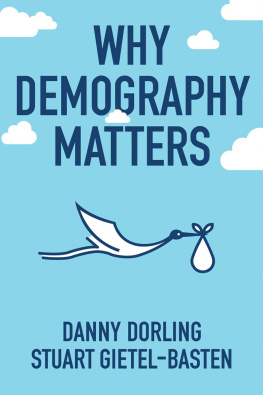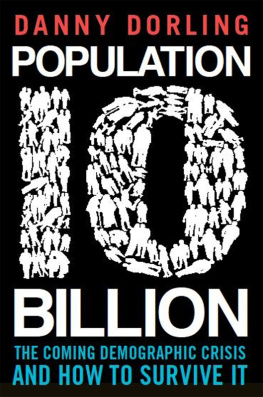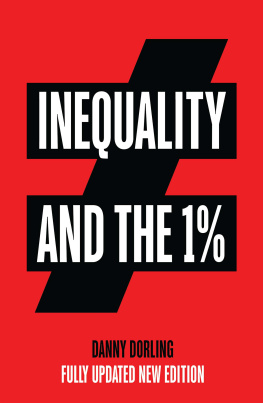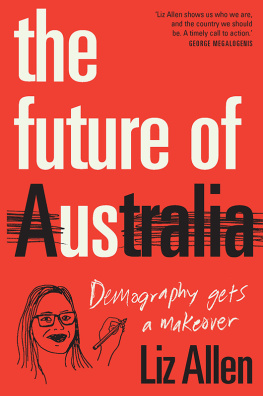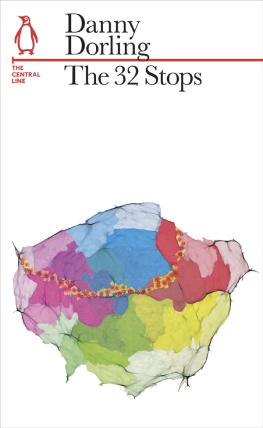Danny Dorling - Why Demography Matters
Here you can read online Danny Dorling - Why Demography Matters full text of the book (entire story) in english for free. Download pdf and epub, get meaning, cover and reviews about this ebook. year: 2017, publisher: Wiley, genre: Politics. Description of the work, (preface) as well as reviews are available. Best literature library LitArk.com created for fans of good reading and offers a wide selection of genres:
Romance novel
Science fiction
Adventure
Detective
Science
History
Home and family
Prose
Art
Politics
Computer
Non-fiction
Religion
Business
Children
Humor
Choose a favorite category and find really read worthwhile books. Enjoy immersion in the world of imagination, feel the emotions of the characters or learn something new for yourself, make an fascinating discovery.
- Book:Why Demography Matters
- Author:
- Publisher:Wiley
- Genre:
- Year:2017
- Rating:3 / 5
- Favourites:Add to favourites
- Your mark:
- 60
- 1
- 2
- 3
- 4
- 5
Why Demography Matters: summary, description and annotation
We offer to read an annotation, description, summary or preface (depends on what the author of the book "Why Demography Matters" wrote himself). If you haven't found the necessary information about the book — write in the comments, we will try to find it.
Why Demography Matters — read online for free the complete book (whole text) full work
Below is the text of the book, divided by pages. System saving the place of the last page read, allows you to conveniently read the book "Why Demography Matters" online for free, without having to search again every time where you left off. Put a bookmark, and you can go to the page where you finished reading at any time.
Font size:
Interval:
Bookmark:

Danny Dorling
Stuart Gietel-Basten
polity
Copyright Danny Dorling and Stuart Gietel-Basten 2018
The right of Danny Dorling and Stuart Gietel-Basten to be identified as Author of this Work has been asserted in accordance with the UK Copyright, Designs and Patents Act 1988.
First published in 2018 by Polity Press
Polity Press
65 Bridge Street
Cambridge CB2 1UR, UK
Polity Press
101 Station Landing Suite 300,
Medford, MA 02155
USA
All rights reserved. Except for the quotation of short passages for the purpose of criticism and review, no part of this publication may be reproduced, stored in a retrieval system or transmitted, in any form or by any means, electronic, mechanical, photocopying, recording or otherwise, without the prior permission of the publisher.
ISBN-13: 978-0-7456-9844-1
A catalogue record for this book is available from the British Library.
Library of Congress Cataloging-in-Publication Data
Names: Dorling, Daniel, author. | Gietel-Basten, Stuart, author.
Title: Why demography matters / Danny Dorling, Stuart Gietel-Basten. Description: Cambridge, UK ; Malden, MA : Polity Press, 2017. | Includes bibliographical references and index.
Identifiers: LCCN 2017019477 (print) | LCCN 2017035266 (ebook) | ISBN 9780745698434 (Mobi) | ISBN 9780745698441 (Epub) | ISBN 9780745698403 (hardback) | ISBN 9780745698410 (pbk.)
Subjects: LCSH: Demography.
Classification: LCC HB871 (ebook) | LCC HB871 .D67 2017 (print) | DDC 304.6--dc23
LC record available at https://lccn.loc.gov/2017019477
The publisher has used its best endeavours to ensure that the URLs for external websites referred to in this book are correct and active at the time of going to press. However, the publisher has no responsibility for the websites and can make no guarantee that a site will remain live or that the content is or will remain appropriate.
Every effort has been made to trace all copyright holders, but if any have been inadvertently overlooked the publisher will be pleased to include any necessary credits in any subsequent reprint or edition.
For further information on Polity, visit our website: politybooks.com
To Celia, Nerice and Paul
Because births, marriages and deaths are not just demographic occurrences or bases for statistical calculations.
They are life-changing human events.
We are grateful to Jonathan Skerrett at Polity for all his encouragement to produce, revise and finish this book on time, and to two anonymous reviewers for many very useful comments on an earlier draft. Mark Fransham and David Dorling very kindly commented on the entire later manuscript, and Adam Keefe redrew all our diagrams to a common standard. Many thanks are also due to Clare Ansell and Rachel Moore at Polity, who worked on the production of this book so efficiently, and to Tim Clark, who proofread the book extremely diligently. All errors remain our responsibility. Demographers know that there are always errors.
Introduction
There is no such thing as destiny.We ourselves shape our own lives.
The ticking time bomb of ageing.
The population explosion (and implosion).
The migration bomb.
Demography appears to promise more bombs and explosions than a Hollywood blockbuster. To continue the movie metaphor: the demographic future is presented like Die Hard (and its four sequels), as an endless fight against explosion after explosion; the best we can hope for is to emulate the cast of The Hurt Locker, trying (sometimes in vain) to defuse all these ticking time bombs. This, so the traditional alarmist narrative goes, is why demography matters. It matters because Chinas ageing population means its future economic growth might soon be checked, with disastrous consequences worldwide. It matters, some say, because migration into the UK will inevitably lead to its public services being overwhelmed. It matters because the tremendous population growth in much of sub-Saharan Africa, coupled with climate change, could lead to conflict, drought, mass relocation and disaster. This could happen, and some might claim that it already partly has. But this is not to say that it will. Indeed, what will happen in terms of numbers of people is far from certain; and what will happen as a result of whatever level our population eventually reaches is even less predictable.
I think were fucked.
There are not many lines in books on demography that our undergraduate students can directly quote, but this one from Stephen Emmotts recent study of the environmental consequences of population growth is certainly a contender. In Ten Billion, Emmott sets out the challenges that have accompanied rapid population growth in the twentieth century, and offers a vision of how they will progress in the current century. His conclusion is profoundly pessimistic. The passage at the end of the book that precedes the line above is as follows: We urgently need to do and I mean actually do something radical to avert a global catastrophe. But I dont think we will (Emmott 2013: 202).
Ten Billion is just one of a huge number of books, articles and press headlines describing the potentially negative consequences of population change. We began writing this book during the build-up to the UKs referendum on EU membership. The Brexit campaign presented horror stories of an out-of-control immigration system, a break down of public services, projected overwhelming population growth soon to be hitting our crowded island leading to the building over of the English greenbelt, and much more besides. In the aftermath, one key aspect of demography immigration was presented as the single most important reason to explain why the UK voted to leave. There was also a rise in fear, hatred and racist attacks. It became apparent that control over immigration was the main factor shaping debate over the process of how to withdraw from the EU. When the vote was analysed demographically the results showed that it was the old who voted for Brexit in the largest numbers, the old who feared the migrants most, or who thought that limiting immigration would somehow help younger generations (see Dorling, 2016a).
If fertility in the UK had been higher in the past then there would have been more young voters. Had UK society not become so individualistic over the last four decades more of the young might have turned out to vote, and economic inequalities might not have risen so high. We would have been a very different population and had a very different political and demographic make-up had we had a few more children in the 1930s or a few more emigrants in the 1990s. Demography shapes our politics. Politics shapes our demography.
A number of recently published books, mainly emanating from the United States, have sought to paint a bleak future for Europe based upon a convergence of problems associated with its low fertility rates, rapidly ageing population and, in some cases, the fear of some imagined vigorous growth of Islamic culture in Europe (Coleman and Basten, 2015). In China and India, population ageing leading to eventual economic decline is projected to be a core factor in shaping their relative futures, with India perceived to have an in-built economic advantage as it already has far more children.
In Europe, demographic change is painted as being responsible for the crises in pensions, health care and social care, the latter now especially acute in the UK. There are simultaneously too few people in some places and too many in other places, and whether they stay
Next pageFont size:
Interval:
Bookmark:
Similar books «Why Demography Matters»
Look at similar books to Why Demography Matters. We have selected literature similar in name and meaning in the hope of providing readers with more options to find new, interesting, not yet read works.
Discussion, reviews of the book Why Demography Matters and just readers' own opinions. Leave your comments, write what you think about the work, its meaning or the main characters. Specify what exactly you liked and what you didn't like, and why you think so.

